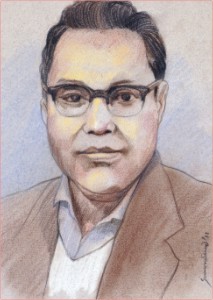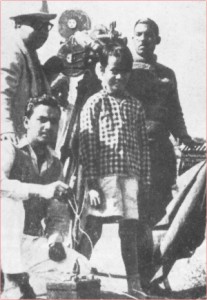 |
Fazlul Haque |
Feature
Fazlul Haque: The Dreamer
Fazlul Haque back then in the 1950s had dreamt of his motion picture studio by the Bogura-Shirajganj road to one day have turned into Greenwood. A green country of ours; and thus Greenwood
------------------------------------------------------
Sayed Shamsul Haque
Fazlul Haque was a dreamer. He not only dreamt for himself, but showed them to others. But not many of us remember him anymore. This is a normal trait of society we forget; more especially so in Bangladesh. History is merely foot prints in the sand in Bangladesh; every new tide seems to erase what has already transpired. Who remembers the ones whose dreams have brought us where we are today?
Fazlul Haque dreamt about the silver screen. But was it only movies? He had dreams about the whole industry surrounding them: literature, arts, novels, etc. His story starts in 1950. He was in his youth and Pakistan had been born recently. It was a time when people from this country knew the art of still photography through the brown baby boxed pinhole camera only, as there were no other technology present that too possessed by only a few people and it was at such a time that he had dreamt of motion pictures being shown on screens in this part of the world. He had dreamt of them being filmed here. He dreamt of a motion pictures' studio. Being a son of Bogra, he thought of the Bogura-Shirajganj road to grow along with him in establishing a motion pictures' society from the neglected part of the left behind land.
Following the name 'Hollywood', people have dubbed film centres of this part of the world as Bollywood, Taliwood, and even Dhaliwood! Fazlul Haque, back then in the 1950s had dreamt of his motion picture studio by the Bogura-Sirajganj road to one day have turned into “Greenwood”. A green country of ours; and thus Greenwood. He had even opened up a company in this very name. A witness to this could still be alive to this day in Shirajganj - Abul Hossain Chowdhury is one of the oldest businessmen in the area. The youngest brother of Abul Hossain, Afsar, a doctor by trade at present, and I used to be under the ISC discipline from Jagannath College. Just like that I had taken off, running away from all studies, one day to travel to Bombay with dreams of becoming a movie director. A young man appeared before me on the Victoria Platform of Bombay one day. He had a Roliflex camera slung over his shoulder. He had a very familiar face.
Instinctually I approached him and asked, “Are you Bengali?”
“Yes!”
“Are you from Sirajganj?”
He was surprised at my question and answered, “Yes!”
I went on asking him, “Are you Afsar's brother?”
The young man now sported an emotion as if he was thunder struck, “Very Strange! How could you guess?”
I got acquainted with him shortly over two cups of tea. He was Afjal Chowdhury. He said he was the Bombay correspondent of the 'Cinema' magazine from Dhaka, and had arrived just a few days back. He carried on saying, “The Editor, Fazlul Haque, sent me here. In reality, I want to learn the trade of a movie camera-man. Haque Bhai has sent me here with a salary of fifty taka every month. I haven't been able to make way to enter the studios to learn the work as of yet.”
It was from that very city of Bombay that I had written and sent over two articles on cinematography to Fazlul Haque through Afjal's reference. Just as I was about to leave Bombay, a money order was delivered to my doorsteps one day. Money orders were allowed to be issued to-and-fro in India and Pakistan back in those days. The peon counted out twenty takas and handed them over to me. Twenty takas was a tremendous amount of money back then! Must amount to more than a few thousand in value today! I was shocked! Money for writing! It was sent by Fazlul Haque as royalty for my articles. He had written a note in his neat handwriting at the bottom of the money order, “Heard you are coming back to Dhaka. Come meet me straight away.”
I looked up the address to the office of the 'Cinema' magazine as soon as I reached Dhaka. It was situated behind Adalot Para of the old town, on the Court House Street. I introduced myself to Fazlul Haque. He hugged me and said, “You have done well returning to the country. Movies will be made in the country one day. Your work lies here. And you want to write literature, which is very important. The silver screen and literature are not worlds that are far from one another.” Fazlul haque carried on, “But there is yet much left to be done before movies can be made here. I have started publishing this magazine to give the whole scene a start.”
My gaze kept on getting affixed frequently on the very beautiful young woman sitting by herself occupying a table by the corner of the faraway room of the office on that very first day. She was reading a tabloid paper, and was also writing on it now and then. Fazlul haque said, “Come let me get the two of you acquainted. This is my wife Rabeya Khatun. We got married recently.” Since then, since that very first day, Fazlul Haque and Rabeya Apa made an unkempt lad such as me as a part of their team. Our literary gatherings started off with a bang at their house on a regular basis. A few days later I came to know that Rabeya Khatun's and I were born on the same day of the same year. Even though we were exactly the same age, since she being the wife of Fazlul Haque bhai I still her call her Rabeya apa.
 |
Director Fazlul Haque and child actor Faridur Reza Sagar at the shooting of the film 'President' |
It was not only the magazine; Fazlul Haque started publishing books soon as well. His publishing house was named the Inland Press. But why Inland? Inland means just what it suggests, yet how is it in anyway related to what it was named for? In reply Fazlul Haque had said, “When books are mentioned people revert to their origin as from Kolkata, and that's exactly why I am publishing books from Dhaka under the title Inland.” That was not the end. He had even designed the logo of the press using the ancient aesthetics of this part of the world a farmer bearing a bamboo-vessel upon his head. This very press had published Jahir Rayhan's first book a compilation of stories Shurjogrohon (The Sunrise). Everyone knows that Jahir started his journey in the life on the silver screen through the help of A J Kardar. I personally believe that, through the publication of Shurjogrohon, Jahir had started off in movies from the spark given to him by Fazlul Haque.
The book instigates that Jahir was well acquainted with Fazlul Haque since long, and that dreams of being part of the cinema industry was shown to him by Fazlul Haque. Even though Fazlul Haque had continued with the Cinema Magazine and the Inland press, he was advancing with his dreams of the silver screen. When Film Development Corporation (FDC) was established in Dhaka, Fazlul Haque became involved straight away. He opened up a new firm 'Pin to Elephant' in order to gather all the needed material and resources for filming purposes. Yes, this exact name. this meant he was ready to get absolutely anything required for shooting purposes, starting from a mere pin to an elephant. That very elephant was needed for the first play written by me adapted into a film 'Matir Pahar' (Mountain of Soil). Who else had found and provided the elephant? It was Fazlul Haque bhai.
Fazlul Haque was never sitting idle. He had a dream of producing a movie. He started off with a movie named 'President'. His radical ideas were portrayed here as well. I could see the depth of his foresight. He always wanted to make a children's movie that showed courage. The 'President' is one among the very few children's movies as a first attempt. Fazlul Haque from this angle was a pioneer as well.
The life of a human being, any human being, can be amazing from a given perspective. Fazlul Haque had the ability to assume such a perspective; to look at lives of people as a creative person. But I discovered that he was self-destructive. He used to start off with an initiative, yet he could never properly finish the job. I observed the same traits in both his professional and personal lives. The man at one point just disappeared. I can never be detached from such pain. But why do I lament anyways? His dreams were not falsified in any way! When I see Faridur Reza Sagar, I see the apparition of the dreamer Fazlul Haque in his hard working sincere son. When I watch Channel i these days, I am reminded of Fazlul Haque. When I spend time with Rabeya Apa these days, I am reminded of the old days and Fazlul Haque's magazine - the Cinema. When I see Shagar writing literature for children these days, I see the continuance of his father's children's movie 'President'. When I see tasteful productions by Impress Telefilms one after the other on the big screen, I am reminded of Fazlul Haque. He had dreamt of producing so many films, but couldn't. Sagar is fulfilling his dreams now and bringing those movies to the screen. I see the olden unsuccessful, yet the twice as free dreaming Fazlul Haque, within the successful Faridur Reza Sagar.
I can never forget this man. If words do posses any powers, then let them make him be remembered not only in my article. Let him be remembered in all our hearts as well. The ones who are being awarded honors using his name, and the ones to be awarded in the future, they are the ones through whom Fazlul Haque will live on through the ages.
October 2004, Dhaka
Translated by Hasan Ameen Salahuddin
Copyright
(R) thedailystar.net 2011
|
